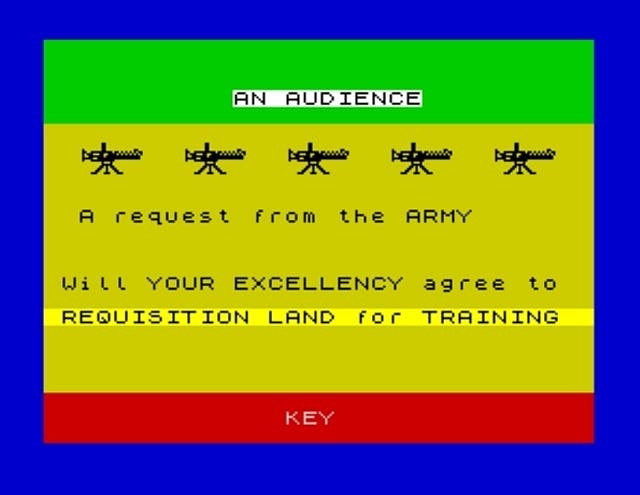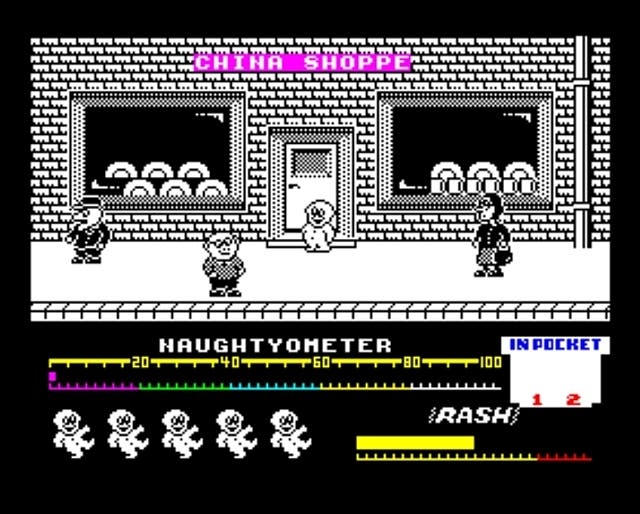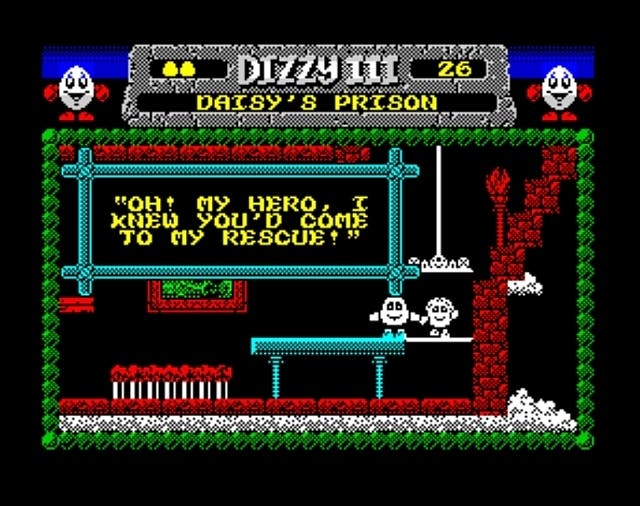Bad Influence
No, not Violet Berlin (sorry).
Naturally though, not every 8-bit distraction threatened to usher in a nuclear winter. Fred (Indescomp, 1983) involved no missile silos at all, but was still no stranger to international scandal. The yellow-hued chap brought action archaeology to a country we can only assume was Egypt (due to the pyramid-based locations and a preponderance of sand); but he was far from Indiana Jones. Whereas Indy restricted himself to shooting at truly nasty beasts such as snakes or Nazis, Fred was happy to spray indiscriminate gunfire around ancient, undiscovered tombs with casual abandon. Countless mummified finds of unimaginable historical importance fell victim to the rogue archaeologists firearm, while he gleefully stuffed his pockets with priceless, foreign trinkets. Little more than legitimised grave-robbing, this shameful piece of coding exhibited Cultural Imperialism at its very worst.
In terms of twisted personal ambition, however, there was really only one contender. Anyone wishing to experience corruption distilled to its purest form needed merely to acquire a copy of Dictator (dk'tronics, 1983). As the name suggests, running an open and democratic system of government was not really on the agenda. Rather, the challenge was keeping the population of fictional nation Ritimba happy just long enough to line your dishonest pockets with cash, followed by a dramatic escape to the air as revolutionaries inevitably surrounded the presidential mansion.
Although providing players with a healthily cynical attitude towards the inner-workings of politics, these benefits were potentially offset by the tricks and tips unwittingly offered to our current crop of MPs. Luckily though, botched arms deals and dodgy backhanders had existed long before the release of this game. So that's alright then.
Social Decay

Not content with attempting to guide the whims of our future political overlords, 8-bit titles also meddled in themes closer to home. Nowhere were these domestic dramas more accurately highlighted than in the implicit subtext of Jack the Nipper (Gremlin, 1986); the nightmarish tale of a baby-gone-bad.
Jack was a hyperactive menace to society, actively rewarded for performing tasks of varying ‘naughtiness' - from murdering helpless flowers to releasing convicted felons back on to the streets - and for generally being a complete pest. Players were left in no doubt that kids are not to be trusted, let alone nurtured and raised, under any circumstances. They also discovered that the only way to defeat an unruly child is through sustained physical abuse in the form of brutal spankings. A generation in need of some serious therapy surely awaits.
Even sweet, innocent Dizzy fell foul of subconscious brainwashing. What could possibly have been bad about Fantasy World Dizzy (Codemasters, 1988), I hear you ask? There was even a commendable warning about alcohol abuse in the form of the utterly useless whiskey bottle, which did nothing except reverse your controls. Yes, quite true. But what was the final task Dizzy must perform for Daisy before she will accept him as a suitable companion? That's right, he had to scrabble around behind bushes looking for enough cash to buy a great big, fancy house. Gender politics never reached such subtle heights again.

Those of honourable intent couldn't find solace in the Olympian dream, either. Daley Thompson's Decathlon (Ocean, 1984) seemed to offer a classic joystick wagglefest - perfect for instilling the noble traditions of sport. Except, tragically, the level of competition demanded was just a little too unrealistic. Daley had three lives, which progressively diminished as a shameful inability to successfully complete events took its deadly toll. That's right, the punishment for failure was nothing less than DEATH for the athlete. Small wonder that many players found the pressure too much to bear and turned to dubious under-the-counter muscle enhancers in order to provide the perfect waggle. A legacy of massively overdeveloped upper arms was the terrible result.
Mind Games
After that mini-trawl through the perverted flipside of seemingly honest software, there can be little doubt that, by now, everyone should be scavenging for food in the dilapidated streets of a post-apocalyptic wasteland. In the rain. Take a glance outside though, and it should be apparent that anarchy has not yet descended upon the nation, mutants are not roaming the land and no-one needs to learn how to grow potatoes in irradiated soil just at the moment. It may still be raining. That's just Britain.

Obviously you'll need to adjust that picture slightly if you live closer to Sellafield than might be considered comfortable, but the basic point remains: dubiously themed games did not destroy the fragile minds of the 8-bit generation. It's all ok. We're fine.
Sure, modern productions possess far greater graphical realism, but they're still unlikely to be confused with real life. The much-discussed Manhunt 2 may be lacking in artistic merit (and could turn out to be a decidedly average sequel), but it still seems sensible to choose pummelling someone to death with a Wiimote-powered wiffle bat above reading a daily red-topped paper. It's pretty clear which one is more likely to cause lasting mental damage.
Anyway, Spectrum gaming never did me any harm. Whenever I find myself at a party, I take a slash in the sink, drop a couple of nasty farts and then turn myself into a sentient gas cooker. Just like all normal, well-adjusted people.